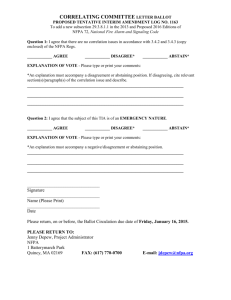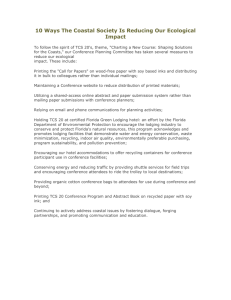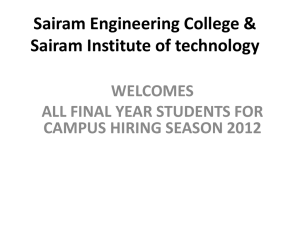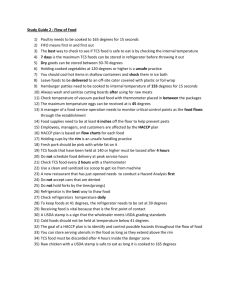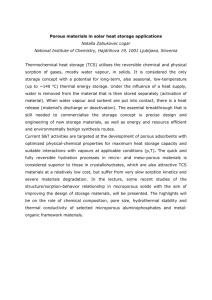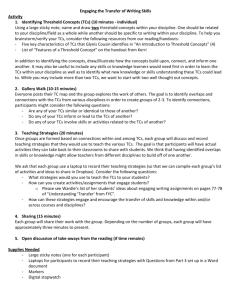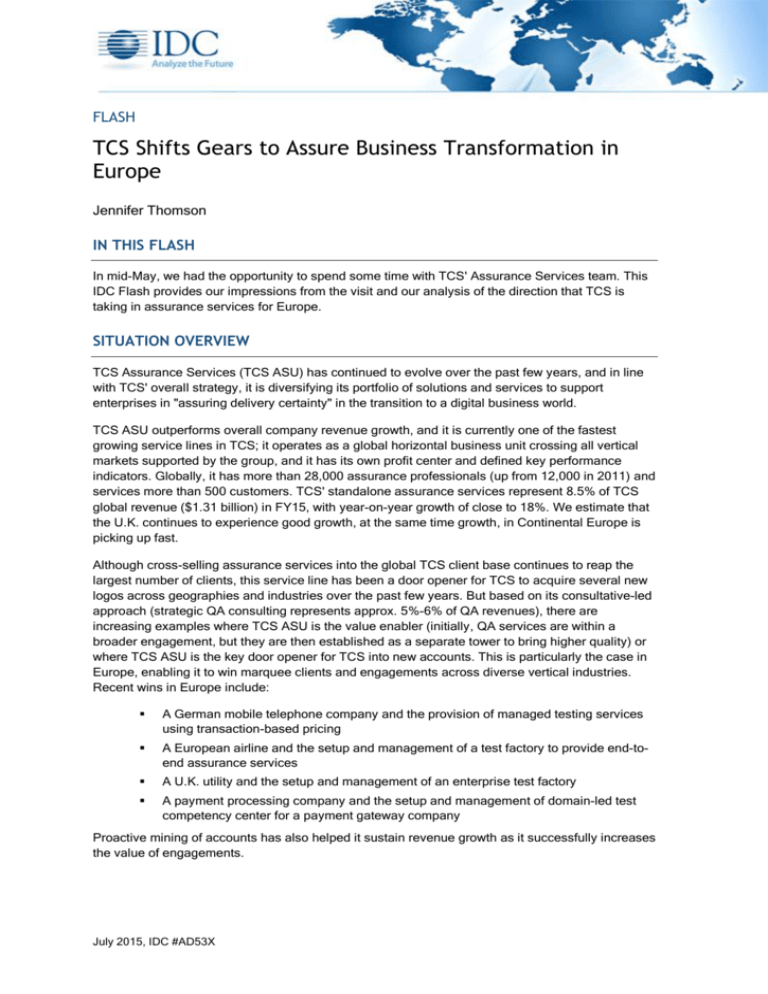
FLASH
TCS Shifts Gears to Assure Business Transformation in
Europe
Jennifer Thomson
IN THIS FLASH
In mid-May, we had the opportunity to spend some time with TCS' Assurance Services team. This
IDC Flash provides our impressions from the visit and our analysis of the direction that TCS is
taking in assurance services for Europe.
SITUATION OVERVIEW
TCS Assurance Services (TCS ASU) has continued to evolve over the past few years, and in line
with TCS' overall strategy, it is diversifying its portfolio of solutions and services to support
enterprises in "assuring delivery certainty" in the transition to a digital business world.
TCS ASU outperforms overall company revenue growth, and it is currently one of the fastest
growing service lines in TCS; it operates as a global horizontal business unit crossing all vertical
markets supported by the group, and it has its own profit center and defined key performance
indicators. Globally, it has more than 28,000 assurance professionals (up from 12,000 in 2011) and
services more than 500 customers. TCS' standalone assurance services represent 8.5% of TCS
global revenue ($1.31 billion) in FY15, with year-on-year growth of close to 18%. We estimate that
the U.K. continues to experience good growth, at the same time growth, in Continental Europe is
picking up fast.
Although cross-selling assurance services into the global TCS client base continues to reap the
largest number of clients, this service line has been a door opener for TCS to acquire several new
logos across geographies and industries over the past few years. But based on its consultative-led
approach (strategic QA consulting represents approx. 5%-6% of QA revenues), there are
increasing examples where TCS ASU is the value enabler (initially, QA services are within a
broader engagement, but they are then established as a separate tower to bring higher quality) or
where TCS ASU is the key door opener for TCS into new accounts. This is particularly the case in
Europe, enabling it to win marquee clients and engagements across diverse vertical industries.
Recent wins in Europe include:
A German mobile telephone company and the provision of managed testing services
using transaction-based pricing
A European airline and the setup and management of a test factory to provide end-toend assurance services
A U.K. utility and the setup and management of an enterprise test factory
A payment processing company and the setup and management of domain-led test
competency center for a payment gateway company
Proactive mining of accounts has also helped it sustain revenue growth as it successfully increases
the value of engagements.
July 2015, IDC #AD53X
People capital has always been a central focus for TCS, and the TCS ASU unit has continued
investments in training (over 1,400 training programs and 9,000 training sessions were completed
in 2014), qualifications (6,000+ certifications),as well as rewards and recognition. It has
established the Assurance Virtual University and set up virtual labs that allow anytime, anywhere,
hands-on learning accessible to all assurance associates. TCS is also working to ensure a
continuous stream of talent and has set up Testimony Program (a TCS software testing contest,
similar in nature to a hackathon) to attract graduates to a career in QA, where QA is a choice and
not an afterthought. Over the past two years, this program has attracted over 60,000 college
graduates.
TCS Assurance Services Portfolio
The remit of QA has expanded significantly over the past few years, and in line with this, TCS has
expanded the scope of its offerings and solutions. The portfolio presented to us spans the test life
cycle to assure an enterprise's journey in business simplification, modernization, and
transformation. There are five core areas:
Consulting and advisory. Test strategy definition; test process assessment — TIARA — this
looks at QA in its entirety where benchmarks have been created (by analyzing data across
industries and projects) to assess best in class and compare a client's test maturity score
against the industry benchmark, test center of excellence setup, test automation
consulting, performance test strategy, tool/product evaluation, compliance assessment,
and assurance management office.
Life cycle. Static testing (risk assessment, risk based testing, walkthroughs), functional
testing (systems integration, regression testing, test automation, user acceptance testing),
and beyond functional testing (performance testing, security testing, usability, accessibility,
etc.).
Application ecosystem. Includes test data management, test environment management,
and release and configuration management. TCS has seen significant growth in this area
and continues to build strategic partnerships — Informatica, CA Technologies, and IBM to
name a few.
Next-generation testing. Digital assurance (mobility, Big Data, assurance on cloud, social
media), structural quality, and test value chain digitization. In the mobility space, TCS has
achieved a good level of maturity in its mobility offerings and IP as well as created a
number of mobility test centers of excellence; recent IDC demand-side research confirms
the growing awareness and recognition of TCS capabilities in this space.
Infrastructure. Network security, network testing, storage and backup testing, server
testing, virtualization testing, disaster recovery testing, cloud testing, etc.
Expanding the services portfolio, IP, relevant partnerships, and demonstrable capabilities in the
QA space is a continual focus. TCS ASU now has over 100 accelerators, filed more than 25
patents, and has more than 65 mature test centers of excellence. Overall, TCS takes an innovative
and quality engineering approach to the development of its solutions and frameworks. Recent
releases include:
DevOps consulting. TCS has launched six discrete offerings in DevOps consulting to
support successful implementation of DevOps, including DevOps readiness assessment,
DevOps assurance training, DevOps assurance metrics, DevOps assurance strategy,
DevOps assurance tools and automation, DevOps assurance OCM (organization change
management).
©2015 IDC
#AD53X
2
NETRA (Non-production environment tracking and release automation). This solution is
aimed at continuing the product engineering journey to develop next-generation
transformation solutions. It is built on CA release automation platform and essentially
jumpstarts DevOps adoption.
Target 2 Securities. This is a simulator tool to accelerate testing for T2S implementation
projects across Europe.
eCommerce application test automation. This offers pre-automated test scripts for
ecommerce testing (e.g., 300+ prepackaged automation test scripts for retail B2C, 150+
prepackaged automation test scripts for online banking, and 150+ prepackaged
automation scripts for telecom ecommerce).
Experiencing and Assuring Certainty
We had the opportunity to experience firsthand the TCS Digital Customer Experience Center as
well as visit the TCS HP Assurance Innovation Hub.
The TCS Digital Customer Experience Center showcased a number of new solutions: iBrowse
(browser compatibility test automation tool), NETRA (mentioned previously), and mGuard (mobile
security tool). This center demonstrated not only the full-scale capabilities of TCS but also the
evolution and innovation in its offerings and IP to support digital assurance.
The TCS HP Assurance Innovation Hub on the other hand holds the infrastructure and resources
to enable TCS and its partner to jointly deliver tailored customer solutions, jointly develop new
solutions, provide proof of value/concept to customers, develop competency on partner platforms
through the TCS assurance academy, develop new solutions, and beta test new partner products
related to quality assurance. This center clearly demonstrated the collaborative approach that TCS
takes to innovation and capability expansion; this ethic enables TCS to build an ecosystem of
partners, talent, and idea generation. Through its co-innovation network, it has forged a number of
partnerships (now with over 30 in the QA space); these are both a mix of established and start-up
players.
Its focus on IP development and co-innovation pays off as it sees an increasing number of IP
based wins in the U.K. and across Europe, and recent wins include:
Test factory wins — a supermarket chain in the U.K. selected Intelligent Testing System
built in collaboration with CA Technologies to take test automation across the entire life
cycle.
A U.K. multinational insurance company opted for the deployment of CA Lisa Service
Virtualization tool.
Assurance for Business Value
IDC has been advising services providers to ensure that assurance services value propositions
address efficiency gains in terms of time, money, and staff, as well as improved accuracy of QA
and concrete business value enhancement. TCS is certainly on the right path. Focus for TCS is on
enabling customers' success by delivering business outcomes, and in an expanding number of
clients, TCS now plays a key role in assuring customer experience and business results. We had
the opportunity to experience the work that TCS is doing for a large U.K retailer and gain insight
into the business value that has been delivered.
©2015 IDC
#AD53X
3
Over the past two and a half years, TCS reengineered the entire ecommerce system — from
development and test to implementation and management. TCS has four core test teams in place:
DevOps, test data management, performance testing, and functional end-to-end testing. In the
engagement, TCS focused on test automation and continuous improvement, and it was able to
initially reduce the cost per test case by 8% to give overall efficiency gains of £1.5 million. There is
now emphasis on continuous deployment/DevOps implementation, with the next goal to reduce the
cost per test case by 13% and shift to an adaptive assurance business model.
Overall, it has executed more than 26,000 unique test cases (fully automated) and conducted over
1,000+ performance test runs. Within the engagement, TCS actively focuses on innovation and
has 25 approved items for innovation across operations, efficiency, and experience. Once a
quarter, there is a road map discussion, and it has created an innovation forum within the culture of
the team.
FUTURE OUTLOOK
TCS ASU is successfully moving from being an input-based assurance services partner to
strategic assurance services partner helping enterprises ensure successful business outcomes.
We have the following advice for TCS:
Demonstrate the business value of QA. TCS has some solid customer examples that
demonstrate not only how it helps enterprises ensure successful business outcome, but
also how it has become a partner in the customer journey. Now, in our view, it is essential
to enhance the visibility of these customer successes, both to help to prove the business
value of QA and position TCS as strategic partner in business-value generation. As we
have said before a key challenge for TCS is to get beyond IT and be accepted as a
transformation partner, certainly some of the examples that we were shown clearly
demonstrate that TCS is winning here. The trick now is to capitalize on these wins.
Underline digital assurance capabilities. We find that skillsets, talent, and tools are
inadequate at many European organizations, and this holds back digital transformation.
TCS should push its capabilities in digital assurance. TCS ASU has a full set of nextgeneration assurance offerings that cut across the pillars of the 3rd Platform, or as TCS
refers to it, the digital assurance stack including artificial intelligence (AI) and robotics. TCS
is not alone in the expansion of the QA services portfolio to support an enterprise's digital
transformation journey, but both its client list and solution stack is comprehensive and
expanding, showing TCS' drive to be a frontrunner in this space. For us, the key will be to
maintain momentum as well as to ensure customer references and proof of concepts get
enough visibility in Europe. Make more noise about topics areas such as Big Data, the role
of assurance in DevOps, assurance in digital transformation, next-generation automation,
and so on. Additionally, TCS should transform what it is doing for mobile applications for
emerging Internet-of-Things (IoT) environments and create an IoT assurance business
plan; focus on vertical specificity.
Bolster the QA consulting-led approach. TCS has a strong set of capabilities in strategic
QA consulting services, and these services continue to act as a lever to open an
increasing number of doors. TCS should combine this technology led thinking with its
business-led consulting services to position it as a business transformation partner.
Build ecosystems. For us, success will increasingly be built on a company's ability to bring
clusters of "diversity" together that can be used to create the right scale, products, and
quality. The creation of ecosystems of engagement will increasingly be the norm, and TCS
already has a strong collaborative work ethic at both client and partner side; it should
continue to exploit this to ensure it can tap into this extended network not only to assemble
the right client solution, but to ensure it remains at the forefront of innovation.
©2015 IDC
#AD53X
4
Play to its strengths in quality engineering, innovation, and engineering in the tool space.
Test automation remains a significant area of investment. TCS should push its core
strengths in test automation (consulting services, next-generation frameworks, NETRA,
tools, etc.). Hand-in-hand with the topic of automation is DevOps — TCS should increase
the visibility of its capabilities. While DevOps is not new to the market, adoption has been
somewhat slow in Europe. But increasingly, DevOps is seen as critical for digital
transformation, and recent IDC demand-side research confirms considerable potential for
growth. This opens up a wealth of opportunities as European enterprises require
assistance in bringing such practices to fruition.
©2015 IDC
#AD53X
5
About IDC
International Data Corporation (IDC) is the premier global provider of market intelligence, advisory
services, and events for the information technology, telecommunications and consumer technology
markets. IDC helps IT professionals, business executives, and the investment community make
fact-based decisions on technology purchases and business strategy. More than 1,100 IDC
analysts provide global, regional, and local expertise on technology and industry opportunities and
trends in over 110 countries worldwide. For 50 years, IDC has provided strategic insights to help
our clients achieve their key business objectives. IDC is a subsidiary of IDG, the world's leading
technology media, research, and events company.
IDC U.K.
Chiswick Tower
389 Chiswick High Road
London W4 4AE, United Kingdom
44.208.987.7100
Twitter: @IDC
idc-insights-community.com
www.idc.com
Copyright Notice
This IDC research document was published as part of an IDC continuous intelligence service, providing
written research, analyst interactions, telebriefings, and conferences. Visit www.idc.com to learn more about
IDC subscription and consulting services. To view a list of IDC offices worldwide, visit www.idc.com/offices.
Please contact the IDC Hotline at 800.343.4952, ext. 7988 (or +1.508.988.7988) or sales@idc.com for
information on applying the price of this document toward the purchase of an IDC service or for information on
additional copies or Web rights.
Copyright 2015 IDC. Reproduction is forbidden unless authorized. All rights reserved.

